2015年9月3日雅思阅读真题回忆【附答案】
2015年9月3日雅思写作真题回忆【附答案】
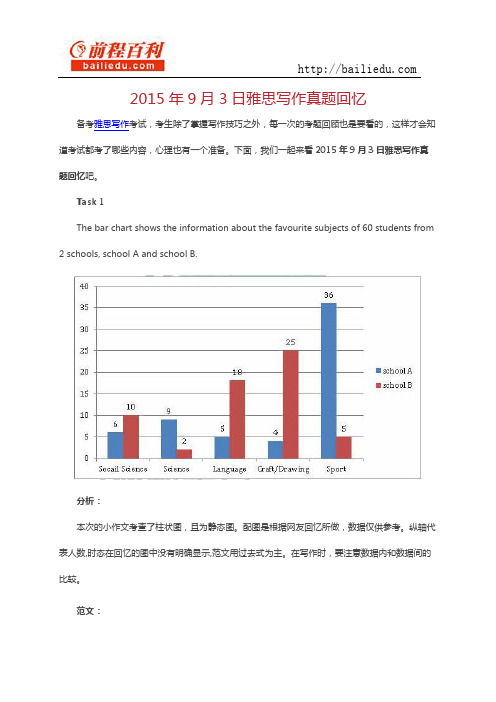
2015年9月3日雅思写作真题回忆备考雅思写作考试,考生除了掌握写作技巧之外,每一次的考题回顾也是要看的,这样才会知道考试都考了哪些内容,心理也有一个准备。
下面,我们一起来看2015年9月3日雅思写作真题回忆吧。
Task 1The bar chart shows the information about the favourite subjects of 60 students from 2 schools, school A and school B.分析:本次的小作文考查了柱状图,且为静态图。
配图是根据网友回忆所做,数据仅供参考。
纵轴代表人数,时态在回忆的图中没有明确显示,范文用过去式为主。
在写作时,要注意数据内和数据间的比较。
范文:The bar chart shows the students’major preference between school A and school B. The optional subjects are social science, science, language, sport and craft & drawing.In school A, more than half of the students (36) chose sport as their favourite subject, compared with 5 in school B. By contrast, the rest subjects are all not very popular among students in school A.In school B, 25 students enjoyed craft and drawing, which was more than five times as many as the students number in school A.(4). Also, the figure in language came second in school B, roughly reaching 18 and narrowly beating social science into third place. In addition, no matter in school A or school B, students were not quite interested in social science and science, with less than 10 persons in both.Overall, students in school A and school B had different major preference. Students in school A liked sport the most and disliked craft and drawing while students in school B were more fond of craft and drawing taut were not much crazy about science.Task 2题目:Many people are afraid to leave their homes because of their fear of crime. Some people believe that more actions should be taken to prevent crime, but others feel that little can be done. Discuss both views and give your own opinion.题型:论述类议论文分析:今天出现的是2012年11月3日的老题,而且犯罪类也是常考话题之一。
公共英语等级考试_2015年9月公共英语二级考试真题及答案
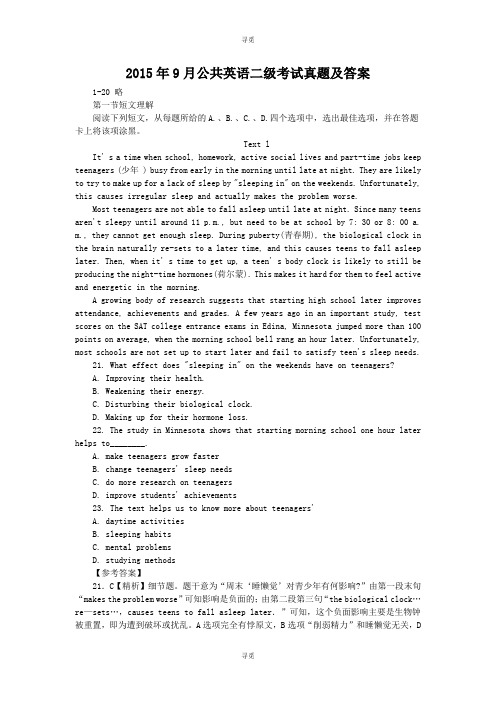
2015年9月公共英语二级考试真题及答案1-20 略第一节短文理解阅读下列短文,从每题所给的A.、B.、C.、D.四个选项中,选出最佳选项,并在答题卡上将该项涂黑。
Text lIt' s a time when school, homework, active social lives and part-time jobs keep teenagers (少年 ) busy from early in the morning until late at night. They are likely to try to make up for a lack of sleep by "sleeping in" on the weekends. Unfortunately, this causes irregular sleep and actually makes the problem worse.Most teenagers are not able to fall asleep until late at night. Since many teens aren't sleepy until around 11 p.m., but need to be at school by 7: 30 or 8: 00 a. m., they cannot get enough sleep. During puberty(青春期), the biological clock in the brain naturally re-sets to a later time, and this causes teens to fall asleep later. Then, when it' s time to get up, a teen' s body clock is likely to still be producing the night-time hormones(荷尔蒙). This makes it hard for them to feel active and energetic in the morning.A growing body of research suggests that starting high school later improves attendance, achievements and grades. A few years ago in an important study, test scores on the SAT college entrance exams in Edina, Minnesota jumped more than 100 points on average, when the morning school bell rang an hour later. Unfortunately, most schools are not set up to start later and fail to satisfy teen's sleep needs.21. What effect does "sleeping in" on the weekends have on teenagers?A. Improving their health.B. Weakening their energy.C. Disturbing their biological clock.D. Making up for their hormone loss.22. The study in Minnesota shows that starting morning school one hour later helps to________.A. make teenagers grow fasterB. change teenagers' sleep needsC. do more research on teenagersD. improve students' achievements23. The text helps us to know more about teenagers'A. daytime activitiesB. sleeping habitsC. mental problemsD. studying methods【参考答案】21.C【精析】细节题。
2015年9月公共英语二级考试真题及答案(阅读)
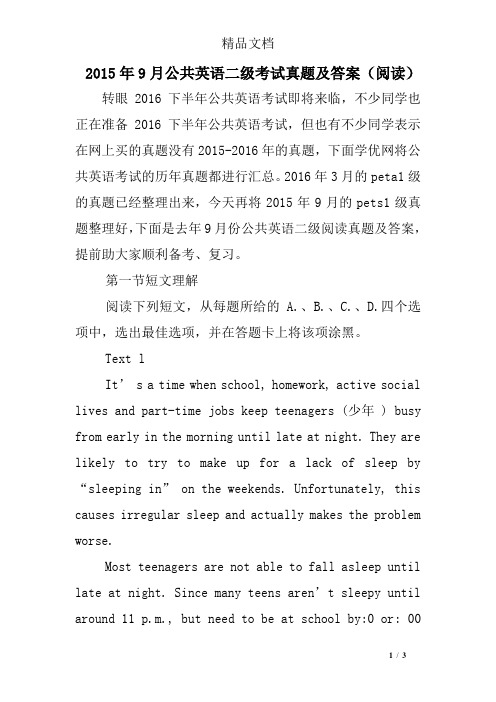
2015年9月公共英语二级考试真题及答案(阅读)转眼2016下半年公共英语考试即将来临,不少同学也正在准备2016下半年公共英语考试,但也有不少同学表示在网上买的真题没有2015-2016年的真题,下面学优网将公共英语考试的历年真题都进行汇总。
2016年3月的peta1级的真题已经整理出来,今天再将2015年9月的pets1级真题整理好,下面是去年9月份公共英语二级阅读真题及答案,提前助大家顺利备考、复习。
第一节短文理解阅读下列短文,从每题所给的 A.、B.、C.、D.四个选项中,选出最佳选项,并在答题卡上将该项涂黑。
Text lIt’ s a time when school, homework, active social lives and part-time jobs keep teenagers (少年 ) busy from early in the morning until late at night. They are likely to try to make up for a lack of sleep by “sleeping in” on the weekends. Unfortunately, this causes irregular sleep and actually makes the problem worse.Most teenagers are not able to fall asleep until late at night. Since many teens aren’t sleepy until around 11 p.m., but need to be at school by:0 or: 00a. m., they cannot get enough sleep. During puberty(青春期), the biological clock in the brain naturally re-sets to a later time, and this causes teens to fall asleep later. Then, when it’ s time to get up, a teen’ s body clock is likely to still be producing the night-time hormones(荷尔蒙). This makes it hard for them to feel active and energetic in the morning.A growing body of research suggests that starting high school later improves attendance, achievements and grades. A few years ago in an important study, test scores on the SAT college entrance exams in Edina, Minnesota jumped more than 100 points on average, when the morning school bell rang an hour later. Unfortunately, most schools are not set up to start later and fail to satisfy teen’s sleep needs.1. What effect does “sleeping in”on the weekends have on teenagers?A. Improving their health.B. Weakening their energy.C. Disturbing their biological clock.D. Making up for their hormone loss.2. The study in Minnesota shows that startingmorning school one hour later helps to________.A. make teenagers grow fasterB. change teenagers’ sleep needsC. do more research on teenagersD. improve students’ achievements3. The text helps us to know more about teenagers’12345免责声明:本文仅代表作者个人观点,与本网无关。
2015年9月公共英语二级真题及答案解析
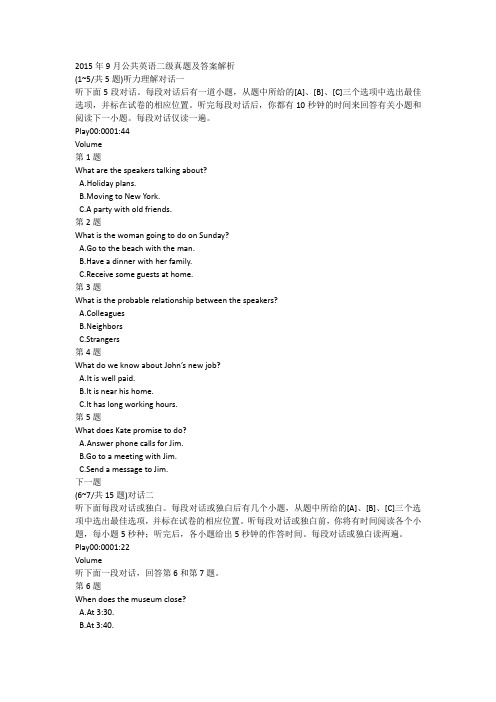
2015年9月公共英语二级真题及答案解析(1~5/共5题)听力理解对话一听下面5段对话。
每段对话后有一道小题,从题中所给的[A]、[B]、[C]三个选项中选出最佳选项,并标在试卷的相应位置。
听完每段对话后,你都有10秒钟的时间来回答有关小题和阅读下一小题。
每段对话仅读一遍。
Play00:0001:44Volume第1题What are the speakers talking about?A.Holiday plans.B.Moving to New York.C.A party with old friends.第2题What is the woman going to do on Sunday?A.Go to the beach with the man.B.Have a dinner with her family.C.Receive some guests at home.第3题What is the probable relationship between the speakers?A.ColleaguesB.NeighborsC.Strangers第4题What do we know about John’s new job?A.It is well paid.B.It is near his home.C.It has long working hours.第5题What does Kate promise to do?A.Answer phone calls for Jim.B.Go to a meeting with Jim.C.Send a message to Jim.下一题(6~7/共15题)对话二听下面每段对话或独白。
每段对话或独白后有几个小题,从题中所给的[A]、[B]、[C]三个选项中选出最佳选项,并标在试卷的相应位置。
听每段对话或独白前,你将有时间阅读各个小题,每小题5秒种;听完后,各小题给出5秒钟的作答时间。
2015年9月3日雅思考试回忆及解析

2015年9月3日雅思考试回忆及解析听力(网友版)Section1: 填空询问租房的场景,常规的要填地址电话日期section2:旅游场景,是一个昆士兰旅游活动的介绍单选多选都有section3:一个图关于机器部件的....讨论一个磨谷物的机器,貌似是grain millsection4:讲动物,关于濒危种群听力考试概述:Section 1 旧题。
住宿场景-租房咨询。
填空10。
Section 2 旧题。
旅游场景-旅游景点介绍。
单选6+多选4。
Section 3 旧题。
学术场景-新型磨面机讨论。
配对6+单选4。
Section 4 旧题。
学术讲座-濒危动物。
填空10。
本场考试题目四旧零新。
填空20题,选择配对20题,非常均衡。
Section 3有匹配类图示题较为特殊,其余题目均较为常规.阅读(网友版)Passage1: 讨论人类行为Passage2: 讲urban coyote(北美草原的小狼)Passage3: 讲动物的创造性和认知能力作文(网友版)小作文:柱形图,谈School A & School B的五门课程受欢迎人数的比较。
大作文:People are afraid to leave their homes for fear of crimes. Some people believe that more action should be taken to prevent crimes while others think that little could be done. Discuss both sides and give your opinion.大作文很多人因为犯罪越来越多不敢走出家门,有人认为更多的措施可以防止犯罪而有些人认为能做的很少,讨论并给观点。
口语(网友版)口语考试整体概述:雅思口语已经进入了9月换题月。
雅思口语话题每年都有三次大变化,分别是一月、五月和九月。
2015年雅思阅读模拟试题及答案解析五
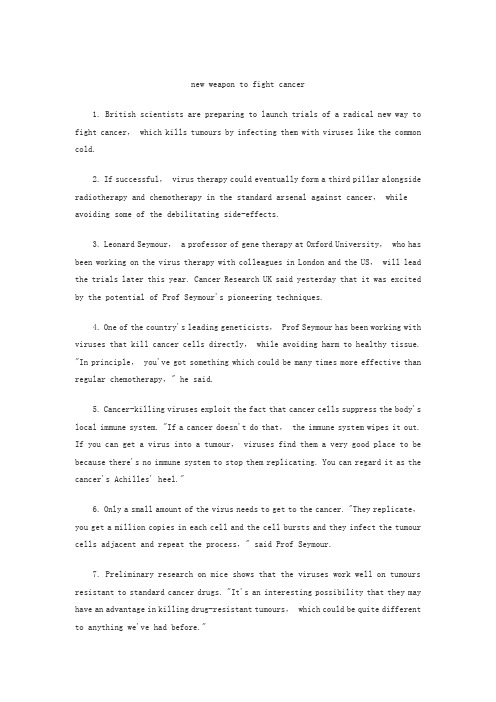
new weapon to fight cancer1. British scientists are preparing to launch trials of a radical new way to fight cancer, which kills tumours by infecting them with viruses like the common cold.2. If successful, virus therapy could eventually form a third pillar alongside radiotherapy and chemotherapy in the standard arsenal against cancer, while avoiding some of the debilitating side-effects.3. Leonard Seymour, a professor of gene therapy at Oxford University, who has been working on the virus therapy with colleagues in London and the US, will lead the trials later this year. Cancer Research UK said yesterday that it was excited by the potential of Prof Seymour's pioneering techniques.4. One of the country's leading geneticists, Prof Seymour has been working with viruses that kill cancer cells directly, while avoiding harm to healthy tissue. "In principle, you've got something which could be many times more effective than regular chemotherapy," he said.5. Cancer-killing viruses exploit the fact that cancer cells suppress the body's local immune system. "If a cancer doesn't do that, the immune system wipes it out. If you can get a virus into a tumour, viruses find them a very good place to be because there's no immune system to stop them replicating. You can regard it as the cancer's Achilles' heel."6. Only a small amount of the virus needs to get to the cancer. "They replicate,you get a million copies in each cell and the cell bursts and they infect the tumour cells adjacent and repeat the process," said Prof Seymour.7. Preliminary research on mice shows that the viruses work well on tumours resistant to standard cancer drugs. "It's an interesting possibility that they may have an advantage in killing drug-resistant tumours, which could be quite different to anything we've had before."8. Researchers have known for some time that viruses can kill tumour cells and some aspects of the work have already been published in scientific journals. American scientists have previously injected viruses directly into tumours but this technique will not work if the cancer is inaccessible or has spread throughout the body.9. Prof Seymour's innovative solution is to mask the virus from the body's immune system, effectively allowing the viruses to do what chemotherapy drugs do - spread through the blood and reach tumours wherever they are. The big hurdle has always been to find a way to deliver viruses to tumours via the bloodstream without the body's immune system destroying them on the way.10. "What we've done is make chemical modifications to the virus to put a polymer coat around it - it's a stealth virus when you inject it," he said.11. After the stealth virus infects the tumour, it replicates, but the copies do not have the chemical modifications. If they escape from the tumour, the copies will be quickly recognised and mopped up by the body's immune system.12. The therapy would be especially useful for secondary cancers, called metastases, which sometimes spread around the body after the first tumour appears. "There's an awful statistic of patients in the west ... with malignant cancers;75% of them go on to die from metastases," said Prof Seymour.13. Two viruses are likely to be examined in the first clinical trials:adenovirus, which normally causes a cold-like illness, and vaccinia, which causes cowpox and is also used in the vaccine against smallpox. For safety reasons, both will be disabled to make them less pathogenic in the trial, but Prof Seymour said he eventually hopes to use natural viruses.14. The first trials will use uncoated adenovirus and vaccinia and will be delivered locally to liver tumours, in order to establish whether the treatment is safe in humans and what dose of virus will be needed. Several more years of trials will be needed, eventually also on the polymer-coated viruses, before the therapy can be considered for use in the NHS. Though the approach will be examined at firstfor cancers that do not respond to conventional treatments, Prof Seymour hopes that one day it might be applied to all cancers.Questions 1-6 Do the following statements agree with the information given in the reading passage? For questions 1-6 writeTRUE if the statement agrees with the informationFALSE if the statement contradicts the informationNOT GIVEN if there is no information on this in the passage1.Virus therapy, if successful, has an advantage in eliminating side-effects.2.Cancer Research UK is quite hopeful about Professor Seymour’s work on the virus therapy.3.Virus can kill cancer cells and stop them from growing again.4.Cancer’s Achilles’ heel refers to the fact that virus may stay safely ina tumor and replicate.5.To infect the cancer cells, a good deal of viruses should be injected into the tumor.6.Researches on animals indicate that virus could be used as a new way to treat drug-resistant tumors.Question 7-9 Based on the reading passage, choose the appropriate letter from A-D for each answer.rmation about researches on viruses killing tumor cells can be found(A) on TV(B) in magazines(C) on internet(D) in newspapers8.To treat tumors spreading out in body, researchers try to(A) change the body’ immune system(B) inject chemotherapy drugs into bloodstream.(C) increase the amount of injection(D) disguise the viruses on the way to tumors.9.When the chemical modified virus in tumor replicates, the copies(A) will soon escape from the tumor and spread out.(B) will be wiped out by the body’s immune system.(C) will be immediately recognized by the researchers.(D) will eventually stop the tumor from spreading outQuestions 10-13 Complete the sentences below. Choose your answers from the list of words. You can only use each word once.NB There are more words in the list than spaces so you will not use them all.In the first clinical trials, scientists will try to ……10…… adenovirus and vaccinia, so both the viruses will be less pathogenic than the ……11…….These uncoated viruses will be applied directly to certain areas to confirm safety on human beings and the ri ght ……12…… needed. The experiments will firstly be ……13……to the treatment of certain cancersList of Wordsdosage responding smallpox virusdisable natural ones injectdirected treatment cold-like illnesskill patients examinedAnswers Keys:1.答案:FALSE (见第2段:If successful, virus therapy could eventually forma third pillar alongside radiotherapy and chemotherapy in the standard arsenal against cancer, while avoiding some of the debilitating side-effects. Virus therapy 只能避免一些副作用,而不是根除。
20150207雅思阅读考题回顾

雅思考试阅读考题回顾朗阁海外考试研究中心王婧考试日期 2015年2月7日Reading Passage 1Title History of Sahara(历史类)(V120616 P1)Question types TRUE/FALSE/NOT GIVEN Short answer questions Summary文章内容回顾A. On October 13,2,000, a small team of palaeontologists led by Paul Sereno of the University of Chicago clambered out of three battered Land Rovers, filled their water bottles, and scattered on foot across the toffee-colored sands of the Tenere desert in northern Niger. The Tenere, on the southern flank of the Sahara, easily ranks among the most desolate landscapes on Earth. The Tuareg, turbaned nomads who for centuries have ruled this barren realm, refer to it as a “desert within a desert”a California-size ocean of sand and rock, where a single massive dune might stretch a hundred miles, and the combination of 120-degree heat and inexorable winds can wick the water from a human body in less than a day. The harsh conditions, combined with intermittent conflict between the Tuareg and the Niger government, have kept the region largely unexplored.B. Mike Hettwer, a photographer accompanying the team, headed off by himself toward a trio of small dunes. He crested the first slope and stared in amazement. The dunes were spilling over with bones. He took a few shots with his digital camera and hurried back to the Land Rovers. ‘I found some bones:' Hettwer said, when the team had regrouped. "But they're not dinosaurs. They're human."C. In the spring of 2005 Sereno contacted Elena Garcea, an archaeologist at the University of Cassino, in Italy, inviting her to accompany him on a return to the site. Garcea had spent three decades working digs along the Nile in Sudan and in the mountains of the Libyan Desert, and was well acquainted with the ancient peoples of the Sahara. But she had never heard of Paul Sereno. His claim to have found so many skeletons in one place seemed farfetched, given that no other Neolithic cemetery contained more than a dozen or so. Some archaeologists would later be skeptical; one sniped that he was just a “moonlighting paleontologist." But Garcea was too intrigued to dismiss him as an interloper. She agreedto join him.D. Garcea explained that the Kiffian were a fishing-based culture and lived during the earliest wet period, between 8,000 and 10,000 years ago. She held a Kiffian sherd next to a Tenerian one. “What is so amazing is that the people who made these two pots lived more than a thousand years apart.E. Over the next three weeks, Sereno and Garcea-- along with five American excavators, five Tuareg guides, and five soldiers from Niger's army, sent to protect the camp from bandits-- made a detailed map of the site, which they dubbed Gobero, after the Tuareg name for the area. They exhumed eight burials and collected scores of artifacts from both cultures. In a dry lake bed adjacent to t he dunes, they found dozens of fishhooks and harpoons carved from animal bone. Apparently the Kiffian fishermen weren't just going after small fry: Scattered near the dunes were the remains of Nile perch, a beast of a fish that can weigh nearly 300 pounds, as well as crocodile and hippo bones.F. Sereno flew home with the most important skeletons and artifacts and immediately began planning for the next field season. In the meantime, he carefully removed one tooth from each of four skulls and sent them to a lab for radiocarbon dating. The results pegged the age of the tightly bundled burials at roughly 9,000 years old, the heart of the Kiffian era. The smaller “sleeping” skeletons turned out to be about 6,000 years old, well within the Tenerian period. At least now the scientists knew who was who.G. In the fall of 2006 they returned to Gobero, accompanied by a larger dig crew and six additional scientists. Garcea hoped to excavate some 80 burials, and the team began digging. As the skeletons began to emerge from the dunes, each presented a fresh riddle, especially the Tenerian. A male skeleton had been buried with a finger in his mouth.H. Even at the site, Arizona State University bioarchaeologist Chris Stojanowski could begin to piece together some clues. Judging by the bones, the Kiffian appeared to be a peaceful, hardworking people. “The lack of head and forearm injuries suggests they weren't doing much fighting,” he told me. “And these guys were strong.” He pointed to a long, narrow ridge running along a femur. “That’s the muscle attachment,” he said. “This individual had huge leg muscles, which means he was eating a lot of protein and had a strenuouslifestyle-- both consistent with a fishing way of life.” For contrast, he showed me the femur of a Tenerian male. The ridge was barely perceptible. “This guy had a much less strenuous lifestyle,” he said, “which you might expect of a herder."I. Stojanowski's assessment that the Tenerian were herders fits the prevailing view among scholars of life in the Sahara 6,000 years ago, when drier conditions favored herding over hunting. But if the Tenerian were herders, Sereno pointed out, where were the herds? Among the hundreds of animal bones that had turned up at the site, none belonged to goats or sheep, and only three came from a cow species. “It’s not unusual for a herding culture not to slaughter their cattle, particularly in a cemetery,M Garcea responded, noting that even modem pastoralists, such as Niger’s Wodaabe, are loath to butcher even one animal in their herd. Perhaps, Sereno reasoned, the Tenerian at Gobero were a transitional group that had not fully adopted herding and still relied heavily on hunting and fishing.J. Back in Arizona, Stojanowski continues to analyze the Gobero bones for clues to the Green Saharans’ health and diet. Other scientists are trying to derive DNA from the teeth, which could reveal the genetic origins of the Kiffian and Tenerian — and possibly link them to descendants living today. Sereno and Garcea estimate a hundred burials remain to be excavated. But as the harsh Tenere winds continue to erode the dunes, time is running out. “Every archaeological site has a life cycle,” Garcea said. “It begins when people begin to use the place, followed by disuse, then nature takes over, and finally it is gone. Gobero is at the end of its life.”两个考古学家找骨头,然后研究两种人(K和T)的历史。
2015年10月31日雅思阅读真题(网友回忆版)

2015年10月31日雅思阅读真题(网友回忆版)2015年10月31日雅思阅读回忆(网友版)阅读两新一旧passage1是讲脸盲症,针对一种人容易对别人的面庞无意识的解释。
说怎样研究他们忘性大,还说了先天和后天的两种可能性passage2 讲新西兰海水养殖。
有标题题和配对题,文章说新西兰的方法能创造收益还能维持海洋生态,还讨论这个模式遇到的问题passage3 讲一个人的书,貌似在批评说那个书的缺点集中在哪些方面。
延伸阅读:雅思阅读评分标准(一)介绍类学术说明文的结构要判断文章类别,一般看标题就可以了。
介绍类文章是对某事物或现象进行描述或介绍,所以标题一般为名词短语或者以How开头的疑问句。
具体结构如下:Introduce a phenomenon or a fact.Detailed Description:Timeline/Different Aspects/Logic DevelopmentLook into the future/Summary无论什么文章,起始段总是引出主题,所以多用叙述描写性语言,或介绍现象,或陈述事实,或交代问题。
在介绍类说明文中,中间断落是对事物细节的展开描述,各种话题可以通过三种不同方式展开。
第一类时间顺序,通常用于陈述一个历史事件,例如剑五中的“Johnson’s Dictionary”就是这一类。
第二类并列或递进,从各个侧面来介绍,例如剑四中的“What Do Whales feel?”,一看标题就知道是介绍鲸鱼各个感官的,属于并列结构。
第三类是逻辑顺序,据笔者统计,环境自然类文章多依照这种顺序,下文对此会作详细评述,这里不再赘言。
(二)论证类文章的结构(1)实验类文章Introduce ExperimentPreexperiment (Subjects, Tools, Methods)Experiment ProcessResult (Collecting Data)Analyses and Syntheses在雅思阅读中,实验类文章结构最为固定。
- 1、下载文档前请自行甄别文档内容的完整性,平台不提供额外的编辑、内容补充、找答案等附加服务。
- 2、"仅部分预览"的文档,不可在线预览部分如存在完整性等问题,可反馈申请退款(可完整预览的文档不适用该条件!)。
- 3、如文档侵犯您的权益,请联系客服反馈,我们会尽快为您处理(人工客服工作时间:9:00-18:30)。
2015年9月3日雅思阅读真题回忆今天小编给大家带来的主要内容是2015年9月3日雅思阅读真题回忆,本次考试三篇文章一旧两新,第一篇为旧题,人类行为研究,标题Decision making and happiness,相关真题可参考CST2P2, C9T4P2。
第二篇为新题,研究的是丛林狼coyote ,动物类题材可参考C7T1P1和C9T1P3。
第三篇也是新题,题材为心理学,研究了一系列动物的认知能力,相关题材可参考C7T1P1和C7T3P1。
所以大家一定要看看考题回顾,以便更好地备考接下来的雅思阅读考试。
Passage 1题目:Decision making and Happiness内容:人类行为研究题型:特殊词匹配4 +判断题5 +选择题4参考文章(高亮为高频词汇)Decision making and HappinessA Americans today choose among more options in more parts of life than has ever been possible before. To an extent the opportunity to choose enhances our lives. It is only logical to think that if some choice is good, more is better; people who care about having infinite options will benefit from them, and those who do not can always just ignore the 273 versions of cereal they have never tried. Yet recent research strongly suggests that psychologically, this assumption is wrong. Although some choice is undoubtedly better than none, more is not always better than less.B Recent research offers insight into why many people end up unhappy rather than pleased when their options expand. We began by making a distinction between ’maximisers’(those who always aim to make the best possible choice) and ’satisficers’(those who aim for “good enough, ”whether or not better selections might be out there).C In particular, we composed a set of statements——the Maximization Scale——to diagnose people' s propensity to maximize. Then we had several thousand people rate themselves from 1 to 7 (from *“completely disagree”to “completely agree”) on such statements as “I never settle for second best ’We also evaluated their sense, of satisfaction with their decisions. We did not define a sharp cutoff to separate maximisers from satisficers, but in general, we think of individuals whose average scores are higher than 4 (the scale' s midpoint) as maximisers and those whose scores are lower than the midpoint as satisficers. People who score highest on the test—the greatest maximisers—engage in more product comparisons than the lowest scorers, both before and after they make purchasing decisions, and they take longer to decide what to buy. When satisficers find an item that meets their standards, they stop looking. But maximisers exert enormous effort reading labels, checking out consumer magazines and trying new products. They also spend more time comparing their purchasing decisions with those of others.D We found that the greatest maximisers are the least happy with the fruits of their efforts. When they compare themselves with others, they get little pleasure from finding out that they did better and substantial dissatisfaction from finding out that they did worse. They are more prone to experiencing regret after a purchase, and if theiracquisition disappoints them, their sense of well-being takes longer to recover. They also tend to brood or ruminate more than satisficers do.E Does it follow that maximisers are less happy in general than satisficers? We tested this by having people fill out a variety of questionnaires known to be reliable indicators of well-being. As might be expected, individuals with high maximization scores experienced less satisfaction with life and were less happy, less optimistic and more depressed than people with low maximization scores. Indeed, those with extreme maximization ratings had depression scores that placed them in the borderline clinical range.F Several factors explain why more choice is not always better than less, especially for maximisers. High among these are ^opportunity costs. * The quality of any given option cannot be assessed in isolation from its alternatives. One of the 'costs' of making a selection is losing the opportunities that a different option would have afforded. Thus an opportunity cost of vacationing on the beach in Cape Cod might be missing the fabulous restaurants in the Napa Valley. EARLY DECISION-MAKING RESEARCH by Daniel Katmeman and Amos Tversky showed that people respond much more strongly to losses than gains. If we assume that opportunity costs reduce the overall desirability of the most preferred choice, then the more alternatives there are, the deeper our sense of loss will be and the less satisfaction we will derive from our ultimate decision.G The problem of opportunity costs will be worse for a maximiser than for a satisficer. The latter' s *good enough1* philosophy can survive thoughts about opportunity costs. In addition, the *good enough* standard leads to much less searching and inspection ofalternatives than the maximiser' s “best“standard. With fewer choices under consideration, a person will have fewer opportunity costs to subtractH Just as people feel sorrow about the opportunities they have forgone, they may also suffer regret about the option they settle on. My colleagues and I devised a scale to measure proneness to feeling regret, and we found that people with high sensitivity to regret are less happy, less satisfied with life, less optimistic and more depressed than those with low sensitivity. Not surprisingly, we also found that people with high regret sensitivity tend to be maximisers. Indeed, we think that worry over future regret is a major reason that individuals become maximisers. The only way to be sure you will not regret a decision is by making the best possible one. Unfortunately, the more options you have and the more opportunity costs you incur, the more likely you are to experience regret.I ln a classic demonstration of the power of sunk costs, people were offered season subscriptions to a local theater company. Some were offered the tickets at full price and others at a discount Then the researchers simply kept track of how often the ticket purchasers actually attended the plays over the course of the season. Full-price payers were more likely to show up at performances thandiscount payers. The reason for this, the investigators argued, was that the full-price payers would experience more regret if they did not use the tickets because not using the more costly tickets would constitute a bigger loss. To increase sense of happiness, we can decide to restrict our options when the decision is not crucial For example, make a rule to visit no more than two stores when shopping for clothing.参考答案:Questions 1-4Use the information in the passage to match the category (listed A-D) with descriptions or deeds below. Write the appropriate letters A-D in boxes 1-4 on your answer sheet.A MaximiserB SatisficerC BothD Neither of them1. finish transaction when the items match their expectation B2. buy the most expensive things when shopping D3. consider repeatedly until they make final decision A4. participate in the questionnaire of the author CQuestions 5-9Do the following statements agree with the information given in Reading Passage 1 In boxes S-9 on your answer sheet, writeTRUE if the statement is trueFALSE if the statement is falseNOT GIVEN if the information is not given in the passage5. With the society' s advancement more chances make our lives better and happier. False6. There is difference of findings by different gender classification. Not Given7. The feeling of loss is greater than that of acquisition. True8. 'Good enough' plays a more significant role in pursuing Jbestr standards of maximiser‘False9. There are certain correlations between the * regret* people and the maximisers. TrueQuestions 10-13Choose the correct letter, A, B, C or D.Write your answers in boxes 10-13 on your answer sheet10. What is the subject of this passage?A. regret makes people less happyB. choices and Well-beingC. an interesting phenomenonD. advices on shopping11. According to conclusion of questionnaires, which of the following statement is correct?A. maximisers are less happyB. state of being optimistic is importantC uncertain results are foundD. maximisers tend to cross bottom line12. The experimental on theater tickets suggested:A. sales are different according to each seasonB. people like to spend on the most expensive itemsC people feel depressed if they spend their vouchersD. people would regret if they failed to spend on discount sales.13. What is author' s suggestion on how to increase happiness:A. focus the final decisionB. be sensitive and smartC. reduce the choice or optionD. read label carefully(仅供参考)Passage 2:题目:Coyote内容:研究丛林狼——数量的变化、人类活动对丛林狼的影响、未来丛林狼的生存问题题型:段落细节匹配5+填空4+选择4题号:新题这是一篇关于coyote郊狼从野外到城市里生存的文章, 郊狼转战城市的原因是森林面积减少, 郊狼食肉动物,而且适应能力极强,而且在狼逐步灭绝的过程中,郊狼已成为顶端动物。
